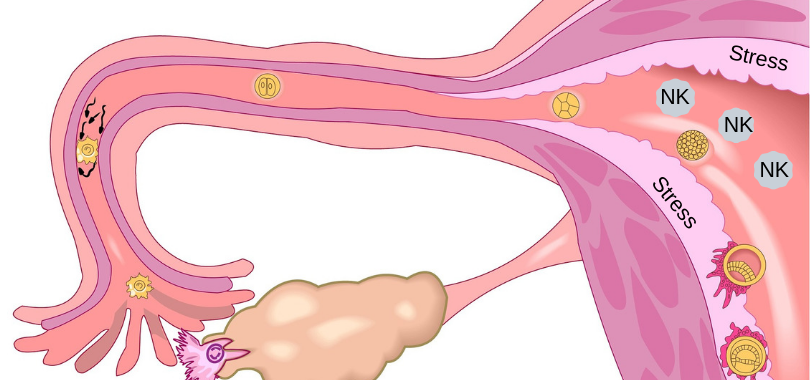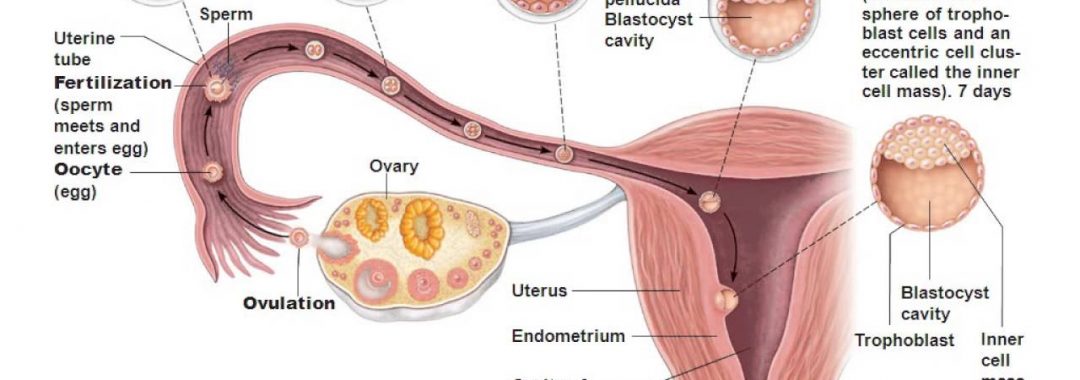It is stressed uterine cells and inflammation causing miscarriage and causing the embryo not to implant, not Uterine Natural Killer cells.
For the first time the functions of natural killer cells in the womb have been identified by Researchers at the University of Warwick and University Hospitals Coventry
Although it has long been known that the lining of the womb harbours dynamic uterine natural killer cells, no functions have so far been given to these cells outside of pregnancy.
The researchers have discovered that the uterine natural killer cells remodel and refresh the lining of the womb at the time of embryo implantation. This is the first time a role for uterine natural killer cells in the lining of the womb has been identified outside of pregnancy. The research was published on December 14, 2017.
In addition they discovered that this process isn’t always balanced in each cycle. The natural killer cells perform the role of targeting and clearing inflammatory stressed cells, thereby making space for the implanting embryo. However sometimes not enough of these cells are cleared away and sometimes too many are targeted and removed. Excessive inflammation or insufficient clearance by uterine natural killer cells makes miscarriage more likely.
For many years I have been trying to tell people that they need to stop trying to get rid of the natural killer cells, or reduce their numbers. I have long known that natural killer cells are meant to be in the body and their job is to protect us from infections, bacteria, cancers, tumours and inflammation.
If killer cells are in high numbers, it means that there is something wrong and that is what needs to be treated, not the killer cells. But unfortunately, many clinics play on couples emotions and the use of the word “Killer”. So then we get this war on killer cells and people wanting to kill the killer cells because they think it is killing their babies.
No matter how hard I have tried to explain it, people just don’t listen and now it is finally great to have the research to back up what I knew all along, plus additional knowledge of how Killer cells actually help with implantation and reducing miscarriage.
The researchers have explained what happens if the natural killer cells cannot do their job properly, or there is inflammation that they haven’t been able to target. They said that a good analogy is Swiss cheese: without holes, the embryo has nowhere to go which will cause implantation failure; but if the holes are too large, the tissue will physically collapse and lead to miscarriage.
This imbalance, which may be short-lived or last for multiple cycles, explains the high rate of early pregnancy failure. It really can be a numbers game on how long that cycle could last and why it is important to make sure there are enough natural killer cells there to do their job properly. Without the natural killer cells, there is more chance of inflammation and stressed uterine cells being left behind, which will then lead to higher pregnancy loss and reduced implantation.
The researchers conducted an analysis of 2,111 endometrial biopsies, which is more than had ever been conducted previously. The research team examined the acutely stressed cells in the lining of the womb which generate tissue inflammation. They found that the natural killer cells which are in the womb perform the important function of selectively targeting and eliminating acutely stressed cells.
When there are high acutely stressed cells in the lining of the uterus, the lining of the uterus fails to sense the chemical signals from the fertilised egg and it then silences many of the genes involved in allowing the embryo to implant and embed into the uterus.
One of the chemicals needed for this process to take place is Trysin, which is a common enzyme the embryos gives off. If trysin isn’t detected the embryo is not accepted and left to disintegrate and then the cycle is reset once again. The lack of Trysin signal appears to indicate to the endometrium that the quality of the embryo is not very high and initiates a reduction of receptivity to implantation. These findings could help to improve the success rates of IVF, because one of the biggest problems with IVF is getting the embryo to implant
The research team also found that high numbers of Natural Killer cells in the endometrium are not only a sign of high inflammation and acutely stressed uterine cells, but also indicate a insufficient production of steroids, which in turn leads to reduced formation of fats and vitamins that are essential for pregnancy nutrition.
Again, this is exactly what I have been trying to say for years and why when I treat women who are having implantation issues and recurrent miscarriage I look at treating the cause of the issue, rather than masking it.
To treat miscarriage and help with embryo implantation you need to do the following
- Reduce inflammation in the uterine environment and pelvic cavity
- Make sure the pelvis, tubes and uterus have been surgically evaluated properly prior to conception, or assisted reproduction (IVF, IUI, ICSI etc)
- Increase blood flow and nutrients into the uterine lining
- Ensure adequate essential fats and nutrients are given prior to conception
- Reduce stress levels
- Increase protein and reduce inflammatory refined carbohydrates
- Make sure the couple in are optimum health (healthy sperm + healthy eggs=health baby)
- Make sure the man is being treated at the same time the woman is (up to 85% of miscarriage issues are related to chromosomal and DNA factors related to poor quality sperm, which cannot be measured by a normal semen analysis)
We need to stop blaming high NK cells as being the cause of miscarriage and embryos not implanting. We need to look at the real cause, which is inflammation, stressed uterine cells ( due to stress in the person), lack of nutrients and blood flow in the uterus and lifestyle factors that is also leading to increase miscarriage rates and reduced embryo implantation.
Let’s not forget that faulty sperm and DNA damage and chromosomal issues with sperm are also a big part of miscarriage too. Miscarriage is not just a woman’s issue. To be honest, statistically it is more likely to be on the male side of the equation and often gets overlooked. But that is a whole other post in itself.
Couples who are part of my fertility program are educated on issues such as this and all the things they need to do to assist them in having a child. The program has assisted over 12,500 babies into the world and my motto is “No Stone Left Unturned.”
Hopefully in the future this new information will be used to screen women at risk of reproductive failure and help with new treatment options for women suffering recurrent miscarriages or recurrent IVF failure.
If you are having trouble conceiving my fertility program may be able to assist you in getting the answers that you need. If you would like to find out more about my fertility program, please call my friendly staff to find out more.
Regards
Dr Andrew Orr
-No Stone Left Unturned
-Women’s and Men’s Health Advocate
-The International Fertility Experts




